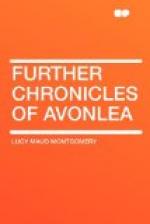“That is for you to find out, Betty,” I said. “By the time you come back you will have discovered it, I think. If not, it will not have proved itself a good reason and shall be forgotten.”
When Betty went away I bade her good-by without burdening her with any useless words of advice.
“Write to me every week, and remember that you are Betty Churchill,” I said.
Betty was standing on the steps above, among her dogs. She came down a step and put her arms about my neck.
“I’ll remember that you are my friend and that I must live up to you,” she said. “Good-by, Stephen.”
She kissed me two or three times—good, hearty smacks! did I not say she was still a child?—and stood waving her hand to me as I rode away. I looked back at the end of the avenue and saw her standing there, short-skirted and hatless, fronting the lowering sun with those fearless eyes of hers. So I looked my last on the child Betty.
That was a lonely year. My occupation was gone and I began to fear that I had outlived my usefulness. Life seemed flat, stale, and unprofitable. Betty’s weekly letters were all that lent it any savor. They were spicy and piquant enough. Betty was discovered to have unsuspected talents in the epistolary line. At first she was dolefully homesick, and begged me to let her come home. When I refused—it was amazingly hard to refuse—she sulked through three letters, then cheered up and began to enjoy herself. But it was nearly the end of the year when she wrote:
“I’ve found out why you sent me here, Stephen—and I’m glad you did.”
I had to be away from home on unavoidable business the day Betty returned to Glenby. But the next afternoon I went over. I found Betty out and Sara in. The latter was beaming. Betty was so much improved, she declared delightedly. I would hardly know “the dear child.”
This alarmed me terribly. What on earth had they done to Betty? I found that she had gone up to the pineland for a walk, and thither I betook myself speedily. When I saw her coming down a long, golden-brown alley I stepped behind a tree to watch her—I wished to see her, myself unseen. As she drew near I gazed at her with pride, and admiration and amazement—and, under it all, a strange, dreadful, heart-sinking, which I could not understand and which I had never in all my life experienced before—no, not even when Sara had refused me.
Betty was a woman! Not by virtue of the simple white dress that clung to her tall, slender figure, revealing lines of exquisite grace and litheness; not by virtue of the glossy masses of dark brown hair heaped high on her head and held there in wonderful shining coils; not by virtue of added softness of curve and daintiness of outline; not because of all these, but because of the dream and wonder and seeking in her eyes. She was a woman, looking, all unconscious of her quest, for love.




